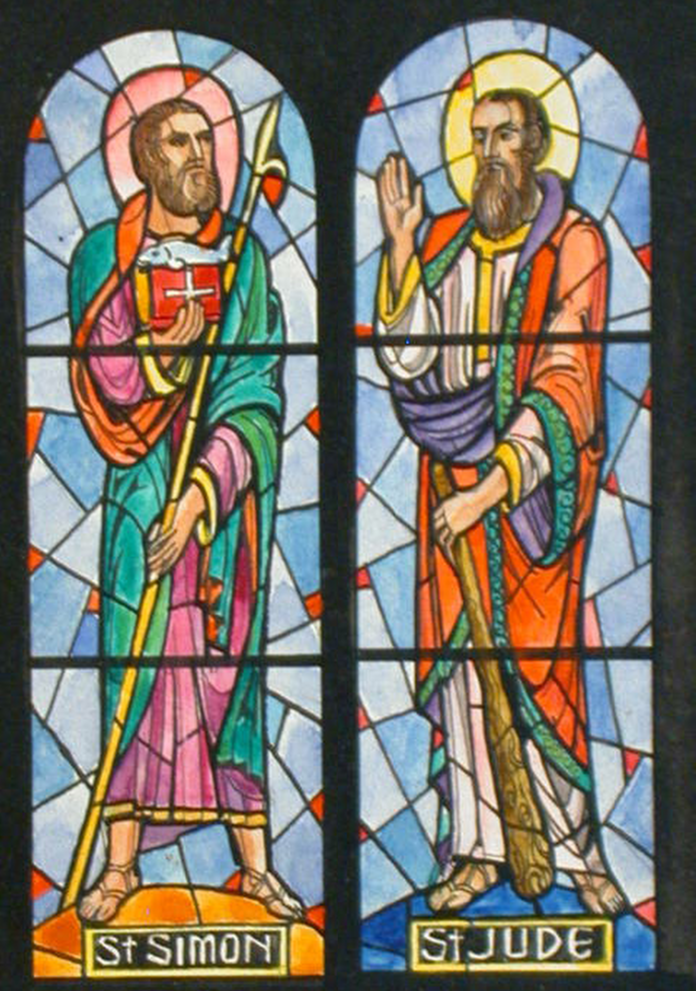Based on the Mass Readings for Saturday, 28th October, 2023
Feast of Saints Simon and Jude (Readings: Eph 2:19-22; Luke 6:12-19)
Today is the last working day of the so-called Synod on Synodality in Rome and the readings for today’s Mass presents three themes that are central to our Catholic understanding and underpinning of the terms of the process:
1] holiness through participation by the people of God,
2] communion with the hierarchy
3] and healing through the mission of the church.
Paul heralds holiness while his protégé Luke holds up hierarchy and healing.
‘All Christians in whatever state or walk of life are called to the fullness of Christian and this holiness is conducive to a more human way of living even in society here on earth’.
These words from Vatican II – on the Church – have framed thinking and talking about what has been termed ‘the universal horizon of holiness’. Of course, Paul would be primary in proclaiming that holiness is not an idea but an incarnate habit that integrates the moral and spiritual lives of Christians. Pope Francis devoted an Apostolic Exhortation, Rejoice and Be Glad (2018) to the task of holiness. Subtitled On the Call to Holiness in Today’s World he set out his method in the following terms:
What follows is not meant to be a treatise on holiness, containing definitions and distinctions helpful for understanding this important subject, or a discussion of the various means of sanctification. My modest goal is to repropose the call to holiness in a practical way for our own time, with all its risks, challenges and opportunities. For the Lord has chosen each one of us “to be holy and blameless before him in love” (Eph 1:4) (Par. 2)
Communion with the hierarchy is not an assertion of authoritarianism but an assurance of continuity with apostolic foundations, the mandate of the twelve chosen by Jesus who we heard today ‘called them apostles’. Literally meaning ‘those sent out’, they are not managers but missionaries, mindful of the mission mentioned by Pope Paul VI: ‘Those who have received the Good News and who have been gathered by it into the community of salvation can and must communicate and spread it’ (Evangelii Nuntiandi, 1974, par.13). Ecclesial communion is not centralisation but concerned with union, mindful of Pope Francis’ call in another Apostolic Exhortation:
‘The strength of what unites all of us as Christians is supremely important. We can be so attentive to what divides us that at times we no longer appreciate or value what unites us’. (Querida Amazonia,108)
Hierarchy serves in the church to shepherd communion with God and within the People of God through the strength of the Holy Spirit. Joseph Ratzinger (Pope Benedict XVI) brings out the meaning of communion in the church:
‘The intimate mystery of the communion between God and humankind is accessible in the sacrament of the Body of the Risen Lord; the mystery requires our body and is realised in one body: the Church constructed by means of the sacrament of the Body of Christ must itself be a body, and a single body, and, conformably to the unity in the Lord, must be expressed in unity and coherence with the teaching of the Apostles.’[1]
After announcing the choice of the apostles Luke shows Jesus straightaway in action, in the middle of ‘those who had come to hear him and to be cured of their diseases’. Hearing the word of God and healing are at the heart of the Gospel. This flows from Jesus’ announcement in Luke of his mission ‘to bring good news to the poor. He has sent me to proclaim release to captives, sight to the blind, to let the oppressed go free’ (4:18-19). When the time came for him to send out the Twelve, Jesus instructed them as follows: ‘And as you go, proclaim that the kingdom of Heaven is close at hand. Cure the sick, raise the dead, cleanse the lepers, drive out demons. (Matt 10:7-8). This fits with Pope Francis’ favourite image of the church, that of the field hospital which takes in and treats the weak, worn out and wounded.
The thing the church needs most today is the ability to heal wounds and to warm the hearts of the faithful; it needs nearness, proximity. I see the church as a field hospital after battle…Heal the wounds, heal the wounds…. And you have to start from the ground up.[2]
Participating by faith in the pilgrimage towards holiness, being in communion in charity with the bishops as beacons of unity, promoting the healing mission of the church, the people of God go forward together in hope.
Fr Kevin O’Gorman SMA
[1] Journey Towards Easter, (St Paul Publications, 1987), 139.
[2] ‘A Big Heart Open to God’, America, 19th September, 2013.

